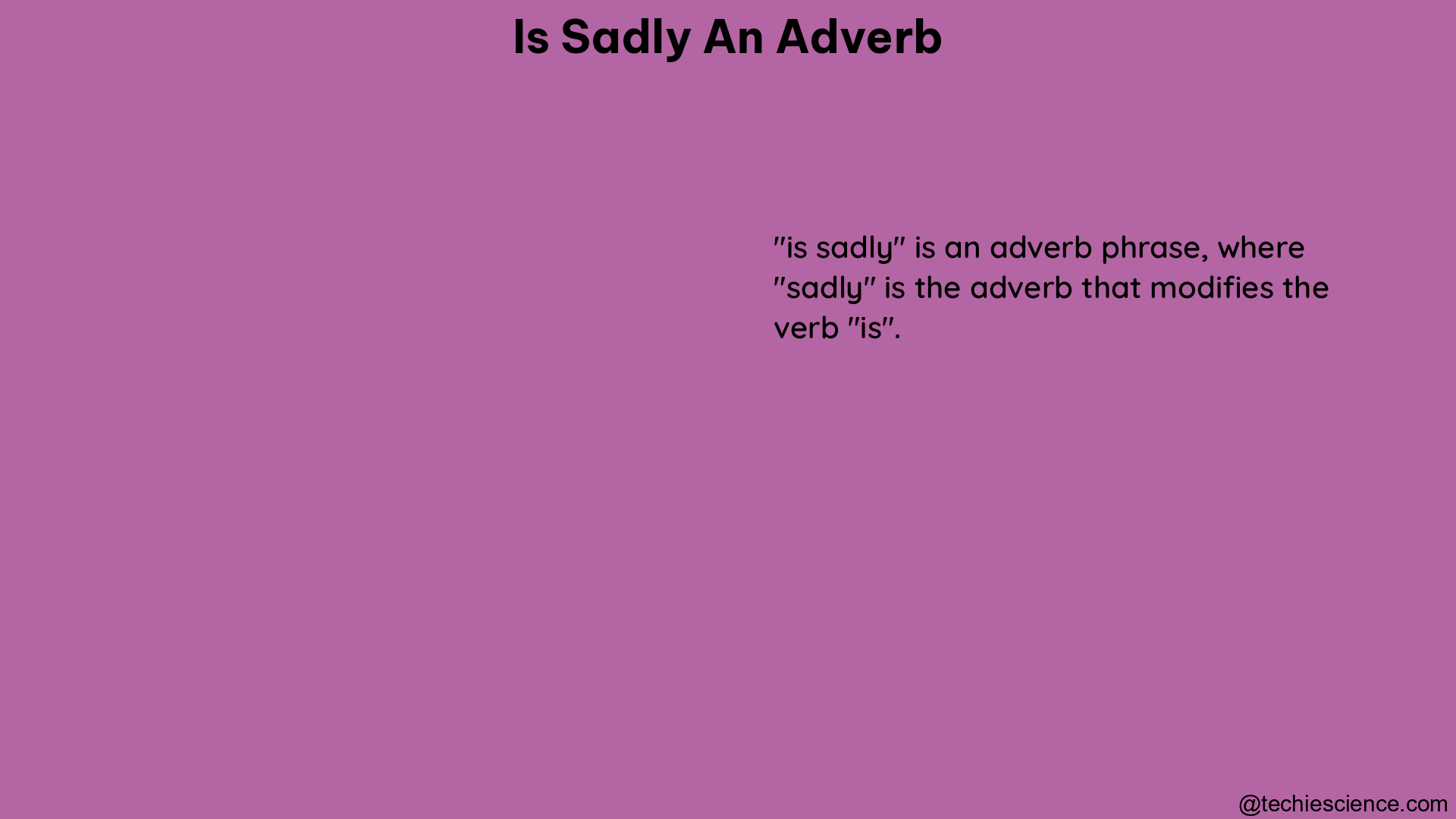“Sadly” is an adverb that is used to describe actions or situations that are unhappy, sorrowful, or regretful. This adverb plays a crucial role in the English language, and understanding its grammatical specifications, usage, and theoretical explanations can greatly benefit English language learners and enthusiasts.
Grammatical Specification of “Sadly”
Definition
“Sadly” is an adverb that means “in an unhappy, sorrowful, or regretful way.”
Usage
The adverb “sadly” can be used to describe actions or situations that evoke sadness or disappointment. For example, “She shook her head sadly” or “They had hoped to win and were sadly disappointed.”
Pronunciation
The pronunciation of “sadly” is /ˈsædli/.
Examples of “Sadly” as an Adverb

In a Sad Manner
- “She shook her head sadly.”
- “He walked away sadly.”
Causing Sadness or Disappointment
- “a garden that has been sadly neglected for many years.”
- “What was top-of-the-line when the house was built was by now sadly outdated.”
Unfortunately
- “Sadly, you can upload a perfectly working website today and return a few months later to find that many of its external links have died off.”
- “Is there a way to get the virus out of an afflicted cat’s system? ‘Sadly, no,’ says Dr. [James] Richards.”
Theoretical Explanation of “Sadly” as an Adverb
Conjunctive Adverb
Although “sadly” is not a conjunctive adverb, it functions similarly. It can be used to connect two independent clauses, but it is typically set off by commas in formal English.
Sentence Adverb
“Sadly” is classified as a sentence adverb, often used at the start of a sentence or in the middle adverb position.
Grammatical Nuances of “Sadly”
Comparison with Other Adverbs
While “sadly” is used to express sadness or regret, other adverbs like “happily,” “joyfully,” or “cheerfully” are used to convey positive emotions. The choice of adverb can significantly impact the tone and meaning of a sentence.
Intensity and Emphasis
The adverb “sadly” can be modified to express varying degrees of intensity or emphasis. For instance, “extremely sadly,” “profoundly sadly,” or “utterly sadly” can be used to convey a deeper level of sorrow or regret.
Placement within a Sentence
The position of “sadly” within a sentence can affect its meaning and emphasis. Placing “sadly” at the beginning of a sentence can highlight the overall sentiment, while positioning it in the middle or end can provide a more subtle emphasis.
Formal vs. Informal Usage
In formal writing or speech, “sadly” is often used to express a sense of regret or disappointment in a measured and polite manner. In more informal contexts, “sadly” may be used with a more casual or colloquial tone.
Practical Applications of “Sadly” as an Adverb
Descriptive Writing
“Sadly” can be a powerful tool in descriptive writing, allowing authors to convey the emotional state of characters or the overall mood of a scene. It can help readers empathize with the characters and better understand the emotional landscape of a story.
Persuasive Writing
In persuasive writing, such as essays or opinion pieces, “sadly” can be used to acknowledge and address counterarguments or unfavorable situations, demonstrating the writer’s understanding and empathy.
Journalistic Writing
Journalists may use “sadly” to report on unfortunate events or outcomes, conveying a sense of sorrow or regret while maintaining an objective tone.
Personal Communication
In personal communication, such as letters, emails, or social media posts, “sadly” can be used to express sympathy, regret, or disappointment, fostering a more empathetic and relatable tone.
Conclusion
In summary, “sadly” is a versatile adverb that plays a crucial role in the English language. By understanding its grammatical specifications, usage, and theoretical explanations, as well as the nuances and practical applications of this adverb, English language learners and enthusiasts can enhance their communication skills and better express their emotions and sentiments.
Reference:
- https://www.dictionary.com/browse/sadly
- https://www.oxfordlearnersdictionaries.com/us/definition/american_english/sadly
- https://www.merriam-webster.com/dictionary/sadly

Hi, My name is Ammu Shaji. I hail from Kerala. I hold a post-graduate degree in English Language and Literature. I am an Academic writer by passion and profession.